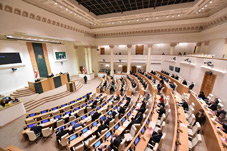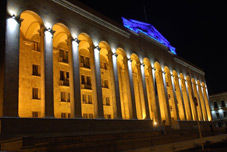
Parliamentary majority to not participate in special Parliament session convened by President
By Khatia Bzhalava
Tuesday, July 19, 2022
Georgian President Salome Zourabichvili on Friday satisfied the opposition’s appeal and signed a decree convening a special session of the Parliament to address the 12-point recommendations outlined by the EU for granting the country the membership candidate status. However, the decision caused controversy among the politicians.
On Monday, the ruling Georgian Dream rebuffed to partake in a “parallel, contrived, sabotaged and unpromising process, planned by the radical opposition.” As Givi Mikanadze, an MP for the ruling Georgian Dream party, said, none of the 81 members of the fraction would participate in it. According to him, the aim of this process was not to contribute to fulfilling the conditions of the European Union for granting the country the membership candidate status but to “deepen the polarisation” of the domestic political environment. He also added that the agenda of the domestic opposition did not comply with the requirements of the Parliament’s regulations.
“We declare once again that we are not going to participate in a parallel, made-up sabotage process planned by the radical opposition with no prospects for the outcome. None of the 81 members of our faction will participate in the special session”, Mikanadze said.
Mikanadze noted that since the Georgian Dream parliamentary faction would not attend the session and the quorum would not be formed, the session could not be opened.
“Salome Zourabichvili said fulfilling the [EC] recommendations requires to team up. The opposition and the ruling team should cooperate, both in working groups, as well as in plenary sessions and committees,” said the President’s Parliamentary Secretary Giorgi Mskhiladze.
The opposition believes the majority’s decision to not attend the session would be a “sabotage and boycott of the European integration process.” As Strategy Agmashenebeli member Paata Manjgaladze noted, “this will directly illustrate that the Georgian dream does not need and does not want EU integration.”


